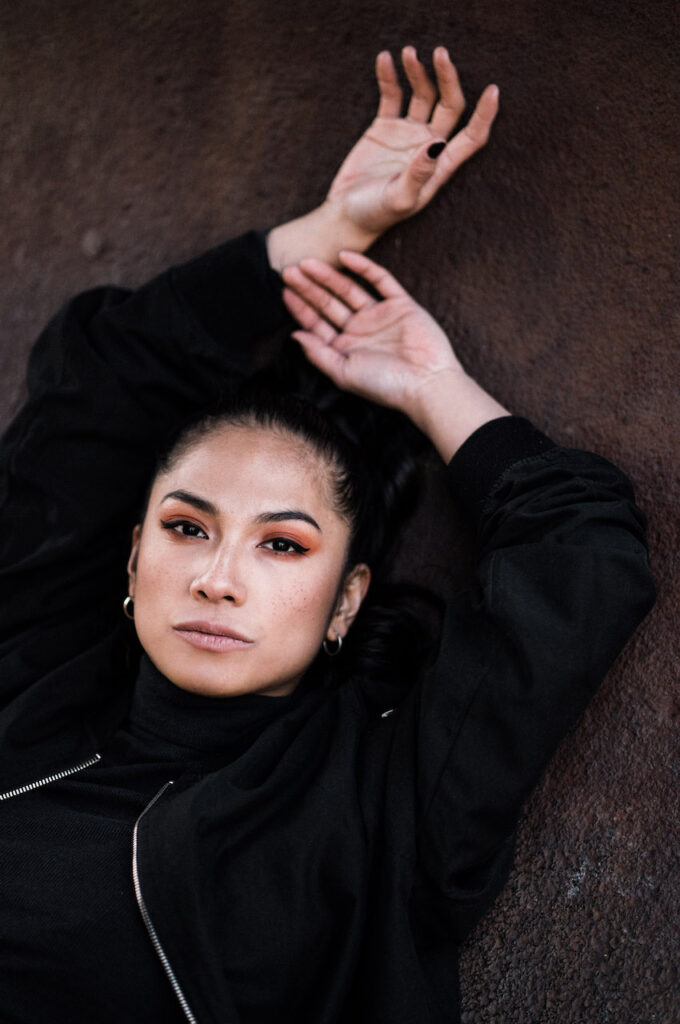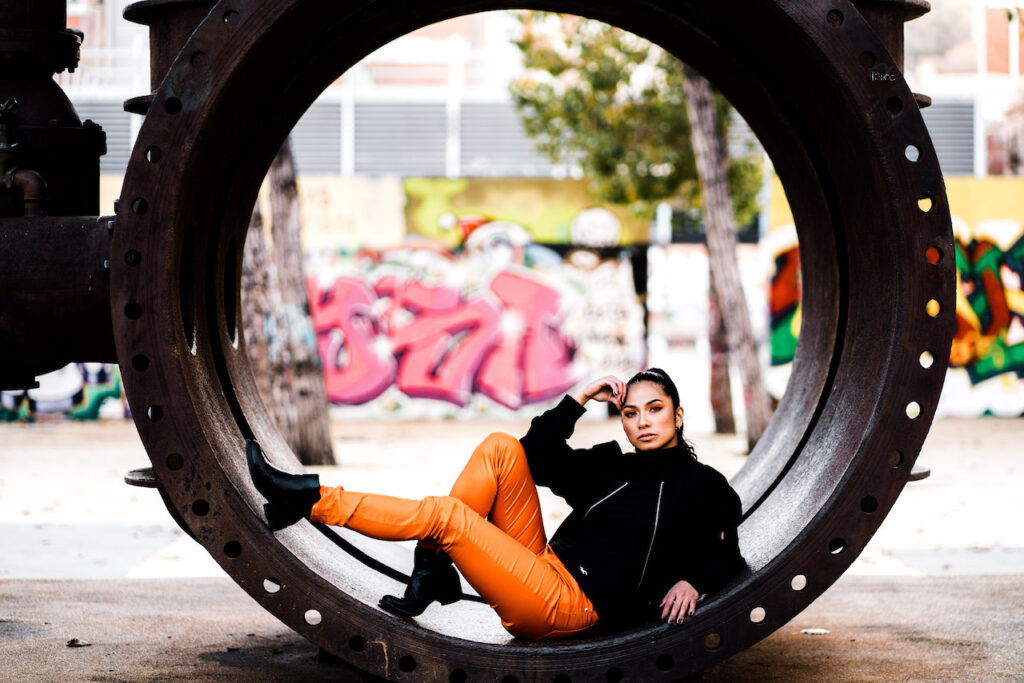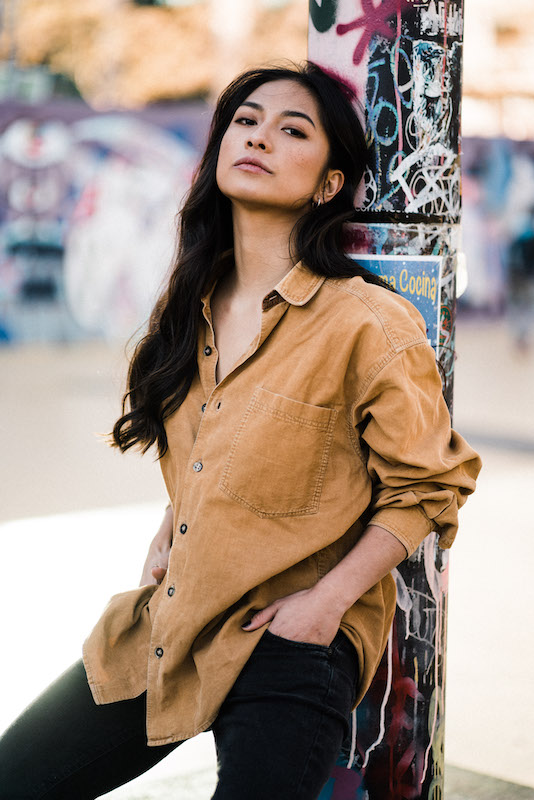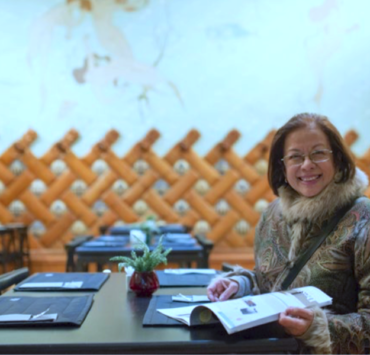She already starred in Spanish movie, reality show, and musicals but her most popular role was in the hit Netflix movie The Platform (El Hoyo). Barcelona-born Filipina actress Alexandra Masangkay take her rostrum and bares her soul. An inclusive interview with The FIlipino Expat Magazine.
Alexandra Masangkay, 29, does not mince words. Her conviction and tenacity are far from the shy 17-year-old I met ten years ago. It is impressive how she managed to become the first Filipino actress to star in a string of major Spanish movies.
Sitting a few feet apart from each other, following the social distancing
rules in Spain, we are in the center of Barcelona. Masangkay was able to squeeze this tête-à-tête before she returns to Madrid. She is wearing no make-up, but she radiates a buoyant energy as she reflects on her journey as an actress.
I met Alexandra Masangkay in 2010 before her stint at the Spanish reality show Operación Triunfo. I was part of a group tasked to mobilize people to vote for her. She was already a familiar figure in the Pinoy community in Barcelona, having won Mutya ng Barcelona 2008 and her constant participation in Filcom events.
She never dreamed of becoming an actress. She wanted to be an engineer. She thought that was what would make her parents happy. Everything took a sudden turn when, unbeknownst to her parents, she decided to audition for Operatión Triunfo. She got in, united the Filipino community in Spain to root for her, placed fourth in the finals and ended up discovering a newfound passion.


After Operación Triunfo, Masangkay ́s showbiz career seemed ready to take
off. But after one recorded single and some shows here and there, it went on taxiing and never lifted off. She went back to school and studied Chemical Engineering at the Universidad Polytécnica de Catalunya, complying with her parents ́ wish of getting a diploma.
For two years, she played the role of a dutiful student, believing that this was her future. But she could not find her focus. She was restless, something was missing in her life. One day Dreamland, a new TV musical called. They were looking for an actress to be part of the show. She immediately moved to Madrid.
Dreamland opened a new world for Masangkay. She underwent rigorous trainings, including dance workshops, acting classes, singing, and song writing sessions. When Dreamland folded, Masangkay decided to give up her studies. Performing was now her catharsis.
Dreamland inspired Alex to hone her craft. She studied acting at the Centro del Actor in Madrid.

“In acting, you need to know where your starting point is. When you run in a race, you must know where the punto de salida is, where you are. Otherwise, you cannot compete.”
Masangkay’s punto de salida is being a daughter of Filipino immigrants.
“I started to see what it is to be a Filipina in Spain.”
Punto de Salida
Masangkay was born in Barcelona, to Felix and Fhe Masangkay who hail from Mabini, Batangas. She and her younger brother were raised with strong Filipino values.
“My father used to remind us that as long as we were under their care, we had to follow his rules.” She grew up close to the Pinoy community in Barcelona. In fact, her extracurricular activities included singing in a Filipino choir and attending Saturday classes with Iskwelang Pinoy, the educational arm of Centro Filipino where third generation Filipino children learn about Philippine history and culture.
Being aware of her roots, she knew she needed to integrate.

“I realized that all my life, I simply wanted to fit in. I always had this necessity to get on well with everybody, so I won’t feel discriminated.”
She considers herself lucky though that she had never experienced outright discrimination. She confesses that her social awareness only came in her twenties.
“I was fortunate that I had a Filipino community behind me. I never felt alone. I talked
to some Filipinos from different parts of Spain, and they told me that they felt different because in some schools, they did not have Asian or Filipino friends. They were the odd men out.”
She believes that Iskwelang Pinoy is a good base for Filipinos born in Spain, making them feel secure about their identity, and teaching them how to embrace both their Filipino and Catalan sides.
When Masangkay arrived in Madrid, she was constantly asked where she was from. She knew that the question was not malicious, so she would just reply as politely as she could. She always feels obliged to explain why she looks foreign, which she thinks is unnecessary.
For her, she was born in Barcelona, she speaks Catalan and Spanish, she is a local.
“The problem is that I look different. I have different values. I am not just any other individual who doesn’t look Spanish, I am a person.” She does not want to highlight her being Filipino, and say, “I am better than you. Or being Spanish is better than me. I was born here but my parents are from the Philippines.”
Being Teresa
In 2015, Masangkay called me to ask if I had a Filipiniana costume to lend her. She was auditioning for a movie. Bent on nailing the role, she left no stone unturned. She studied her mother ́s Tagalog accent, wore a Filipiniaňa at her day job as a shop assistant and practiced her accent with her clients every day.
Masangkay clinched the part. The movie 1898: Los últimos de Filipinas (Our last men in the Philippines) was directed by Salvador Calvo, about the last days of the war for 54 Spanish soldiers caught inside San Luis Obispo de Tolosa church, trying to defend themselves from Filipino revolutionaries in Baler, Quezon. It starred Spain’s award-winning actor Luis Tosar. Masangkay played Teresa, a young Filipino lass caught in the middle of a war, treated as an object, but who used her animal instincts to survive.
The role was a learning process for Masangkay.

“Teresa was a fighter. I am not. She had an ego that I did not have. It was the first time for me to go without makeup. I had always worn make-up in my life. At 23, I realized that it was okay to show my real skin and my imperfections. It was difficult but empowering.”
Teresa did not wear bra either.
“I know that bras are worn to help but since I am not gifted with big pecho, I don’t need them. Teresa was always barefoot too. I learned to accept my body.”
Teresa was for her, a revolution. As a woman, she doesn ́t need cosmetics nor corsets to feel validated.
Masangkay ́s baptism of fire was a sex scene with Luis Tosar.
“I started to ask myself if I wanted to do it. My parents would watch this. I was not prepared psychologically.”
After some soul-searching, she agreed to do the scene, but in the end, it was deleted.
The film garnered 9 nominations at the Goya awards. Masangkay’s debut performance did not go unnoticed, her role was meaty and memorable. She also sang the movie’s theme song. On a personal level, the film inspired her to take time to read Rizal ́s Noli me tangere and a chance to visit Baler, Philippines.

Entering the hole
Masangkay ́s second film came two years after her first. But it would make history as the most popular non-English film in Netflix history, with 56 million views in four weeks.
“El Hoyo” (The Hole orThe Platform), is a grotesque building with unknown levels, two prisoners live on each floor. A grand buffet is sent down to feed all the occupants. Those on the upper floors enjoy the food first, then it goes further down to the unfortunate inhabitants of the lower floors, who are forced to eat leftovers or worse, nothing – a gruesome allegory of the current state of our society.
Masangkay played Miharu, an Asian with no specific nationality. At the audition, she brought out the wild animal in her by jumping and screaming on top of the table. Director Galder Gaztelu-Urrutia, said in one of his interviews, that he originally had a different take on the character but decided to adapt Masangkay’s intuitive interpretation. Miharu is a mentally challenged woman.
“I love my character because of her maternal side. There is a little girl living in El Hoyo and I decided to take care of her.”
The film earned critical praise for being bold and thought- provoking.
Masangkay is grateful for her role. During filming, she was Miharu, not Alex, she lived her character, and discovered Miharu’s power and potency.
“It ́s disgusting to be a woman in El Hoyo. They think that she is weak but it ́s not true. Why is it surprising that she kills? Why is she called a murderer and not a survivor? Is it because she is crazy? I don ́t think so. It ́s because the system feels threatened by a woman. “
A smooth flight and some turbulence
Masangkay’s career finally took off. In between filming, she founded Lapu-lapu, an acting studio for actors of all ages. She also took up classical and jazz dance classes, which led her to the roles of Kiki and Alice Owens in Flashdance, a musical which toured Spain.


“Learning jazz dance was a self-discovery. I realized that one has limits because we put limits on ourselves. I do not know where my limit is, but I know that my fears have limited me. These fears are cultural, from the system, from our education.”
Masangkay was in the middle of her tour when the pandemic broke out. COVID-19 paralyzed the whole entertainment industry. Left with no choice, she decided to disconnect.
She focused her energy on yoga and drawing. She reflected on her life too. Her relationship with her parents has become stronger, especially with her mother.
“During the pandemic, we realized that anything could happen anytime. Everything can change in an instant. We must be conscious of our choices. I don ́t know what is going to happen in the future. But actors are resilient, we always look for alternatives. If it means performing in the streets like in the old times, we would do it.”
Diversity in the film industry
Through the film industry, Masangkay can speak her mind. She has a platform, but it comes with a responsibility. She is optimistic that change will happen, and proud to be part of the process.
But she hopes that the industry will realize that positive discrimination is not the way forward. Actors of colours should no longer be used as fillers or tokens to comply with the concept of diversity. She hopes that the industry will start humanizing these people.

“How many films or series tell the lives of immigrants living in Spain? Maybe someday, Spanish films will start to dig deeper on the characters of people with diverse backgrounds.”
Empowering other actors
She wants to see more active Filipino actors in Spain in the future.
Her advice to those who want to become professional actors.
“Go to an acting school, continue learning, but keep another job on the side. Acting is not a stable job. We formed Lapu-lapu acting studio to offer affordable trainings and a safe network for actors.”
She and her group started “El Encuentro de las Brujas, composed of different actresses coming from the audio-visual world in Spain. They give classes and lectures on feminism and anti-racism. Actresses from different nationalities are welcome.
“Actors should be socially aware because we represent the society.”
Masangkay has finally found her balance, as an artist and a person. She knows who she is, where she is, where she is going. And now she wants to inspire young Asian artists and empower them to become who they want to be.

“One day I want to tell the story of my mother. How she came here, how brave she was. Sending money home. She is like a superhero. I want Spain to know her story.”
Now that restrictions are slowly being lifted, Masangkay returns to shooting. She is starting another film with Luis Tosar, “Proyecto Emperador” and will soon shoot a TV series for Amazon. She also finished a short film called Madilim, Lapu-lapu’s first film production. The turbulence has calmed down. Alexandra Masangkay is here to enjoy the flight.
What's Your Reaction?
Nats Sisma Villaluna has been serving the Filipino community in Spain for more than 13 years. His volunteer works include teaching Spanish to Filipinos, and as artistic director of the Coro Kudyapi, a group of musically inclined young Filipinos in Barcelona. His passion to serve the Filipino community now extends to other countries in his role as Publisher and Editor-in-Chief of the new The Filipino Expat Magazine.
Pepe Chavez is from Baler, Aurora and is currently one of Barcelona’s most sought-after professional photographers. He goes fishing and plays billiards in his free time. He is totally obsessed with aquariums.




